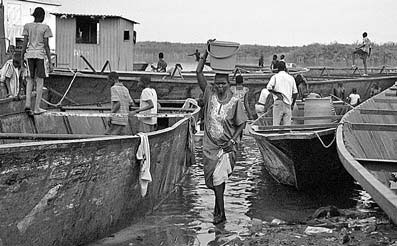Warring parties gather for peace talks
|
A woman gathers water from the White Nile River in the town of Awerial, South Sudan, after crossing in a boat to escape fighting between government and rebel forces in Bor, on Wednesday. Ben Curtis / Associated Press |
Ethiopia to host meetings in hope of ending conflict in South Sudan
South Sudan's warring parties gathered in Ethiopia on Thursday for peace talks hoped to end nearly three weeks of conflict that has left thousands dead in the world's newest nation.
As government and rebel negotiating teams gathered at a luxury hotel in Ethiopia's capital Addis Ababa, aid workers warned of a worsening crisis for civilians affected by the still ongoing conflict in South Sudan.
"We are ready for talks," a member of the rebel delegation said, adding that they remained unclear exactly when meetings would start and in what format.
It was not clear if all members of the two delegations had arrived, suggesting that full face-to-face talks might not take place on Thursday.
Ethiopia is playing a leading role in trying to get the two sides to negotiate a peace deal. But those efforts have been overshadowed by continuing violence in parts of South Sudan, which has been hit by unrest.
Thousands of people are feared to have been killed in the fighting, pitching army units loyal to President Salva Kiir against a loose alliance of ethnic militia forces and mutinous army commanders nominally headed by former vice-president Riek Machar.
Fighting erupted on Dec 15 when Kiir accused Machar of attempting a coup.
Machar has denied this, in turn accusing the president of conducting a violent purge of his opponents, and the fighting has spread across the country, with the rebels seizing several areas in the oil-rich north.
The decision by the two sides to send delegations for initial cease-fire talks has been widely welcomed.
UN special envoy Hilde Johnson said in the capital Juba that it was "positive that they are sending delegations", underscoring the dire need for "reconciliation and healing" after the violence.
"We have seen terrible acts of violence in the past two weeks ... and as we know, if there is no one held accountable, there is a major risk that the violence can continue," she added.
Conditions worsen
Over 200,000 Sudanese refugees who had fled the fighting face a grim situation, with many aid workers who had been supporting them evacuated.
On Tuesday, rebels recaptured Bor, the capital of Jonglei state, just 200 km north of Juba. Bor has changed hands three times since the fighting erupted.
Civilians in the town now face "an increasingly dire situation: water, food and medicines are running out, sanitary conditions are worsening", UN humanitarian chief in the country Toby Lanzer said.
The conflict has also been marked by an upsurge of ethnic violence pitting members of Kiir's Dinka ethnic group against Machar's Nuer community, and the UN Mission in South Sudan said "atrocities are continuing to occur" across the country.
UNMISS reported "extrajudicial killings of civilians and captured soldiers" and the "discovery of large numbers of bodies" in Juba, Bor and Malakal, the main town in the oil-producing Upper Nile state.
On Tuesday, Machar told AFP via satellite phone that he was not yet ready to agree to an immediate cease-fire nor hold face-to-face talks with Kiir, and that his forces were marching on the capital Juba.
"There is no cessation of hostilities yet," Machar said. "That is what the delegation going to Addis Ababa is going to discuss and to negotiate."
Kiir has described the war as "senseless", but has ruled out power sharing with the rebels. The president has also rejected rebel demands that a number of their loyalists, arrested shortly after the violence started, be released.
"If you want power, you don't rebel so that you are awarded with the power," Kiir said in an interview broadcast on the BBC.
South Sudan won independence from Sudan in 2011 after decades of civil war.
AFP-AP



















